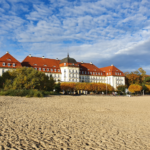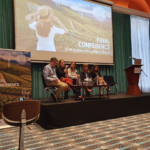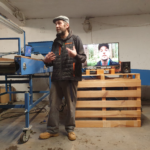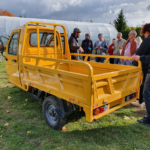 Under the autumnal sky of the vintage sea resort of Sopot adjacent to the Polish coastal metropole of Gdańsk a noteworthy event took place on October 17th and 18th 2022: The final conference of the European pilot project on Smart Villages, Smart Rural 21, having been organised in the premises of the Grand Hotel, where the unrestricted view on the Baltic sea and longest wooden pier in Europe lifted souls and spirits to discuss the final outcomes of the project, the result of intensive collaboration with rural communities and other relevant stakeholders across Europe to realize Smart Villages on the ground of over more than two years.
Under the autumnal sky of the vintage sea resort of Sopot adjacent to the Polish coastal metropole of Gdańsk a noteworthy event took place on October 17th and 18th 2022: The final conference of the European pilot project on Smart Villages, Smart Rural 21, having been organised in the premises of the Grand Hotel, where the unrestricted view on the Baltic sea and longest wooden pier in Europe lifted souls and spirits to discuss the final outcomes of the project, the result of intensive collaboration with rural communities and other relevant stakeholders across Europe to realize Smart Villages on the ground of over more than two years.
The project has been managed by the Bruxelles-based expert group E40 with its director Edina Ocsko in the leading role and five specialist partners (IfLS and empirica from Germany, Innovatiesteunput from Belgium, Agricultural University of Athens/Greece and eConcepts from Ireland). They had a network of national experts in all 27 EU countries plus UK. Having started in the middle of the first surge of Covid19 it had to adapt its ways and means of collaborating to mainly online formats. Thus the conference was considered by most participants – by far exceeding 100 – as a great opportunity of encounter and joy.
Smart Rural 21 has built on achievements, learnings and exchanges within and between 21 pilot villages in 21 EU countries. However, more than 700 villages had initially applied to get selected, and among those who have not been chosen 19 villages followed the invitation to remain in the ambit as so-called Come Along! partners, developing and implementing their own smart village strategies.
Local SV strategies are the centerpiece of the approach which in essence should be participative, area-based and innovative with strong emphasis on social innovation. They range from the hamlet level up to several villages or municipalities. The actual size may reach the one of very small LEADER areas, but all in all they clearly lie one level of scale below the sub-regional CLLD/LEADER approach.
During the conference, the pilot smart villages had sufficient time to present and discuss their achievements. With mainly plenary sessions during the first day, the second day was devoted to workshops which included topics like the role of digital technology, the art of preserving natural, architectural and cultural heritage, the revitalization and re-use of old buildings, new mobility solutions, local energy associations (with the Austrian municipality of Stanz as a very interesting example), the role of elected leaders in the local initiatives and a look into similar projects in other parts of the world, specifically the Caucasian region.
 One workshop dealt with the relationship between Smart Villages and CLLD/LEADER. Not surprisingly, this workshop was the best-booked one. The discussion was facilitated in a way that the participants were invited to first hypothesize how it would be if there were only the one or the other in place. What would be missing if there were only Smart Villages? Well, mainly the institutional anchorage, the public-private partnership assuring durability and acting as a hinge to the sphere of multi-level governance. What would be missing if there were LEADER only? Well, we all witnessed a certain constriction of development pathways, certainly not exclusively but considerably caused by bureaucratic encroachment. So Smart Villages could undoubtedly play a role in freshening up the innovative and bottom-up approach at the smallest scale which sometimes falls from the view of stakeholders operating at sub-regional level. In the second half of the workshop the participants were called to think the two together – in how far they could complement each other and multiply their respective benefits. Invited by the conference organisers to epitomize the essence of the workshop in one sentence, the facilitator (Kirsten Birke Lund from Denmark), the discussant (Robert Lukesch from Austria) and the rapporteur (Kim Smedslund from Sweden) crafted the following sentence:
One workshop dealt with the relationship between Smart Villages and CLLD/LEADER. Not surprisingly, this workshop was the best-booked one. The discussion was facilitated in a way that the participants were invited to first hypothesize how it would be if there were only the one or the other in place. What would be missing if there were only Smart Villages? Well, mainly the institutional anchorage, the public-private partnership assuring durability and acting as a hinge to the sphere of multi-level governance. What would be missing if there were LEADER only? Well, we all witnessed a certain constriction of development pathways, certainly not exclusively but considerably caused by bureaucratic encroachment. So Smart Villages could undoubtedly play a role in freshening up the innovative and bottom-up approach at the smallest scale which sometimes falls from the view of stakeholders operating at sub-regional level. In the second half of the workshop the participants were called to think the two together – in how far they could complement each other and multiply their respective benefits. Invited by the conference organisers to epitomize the essence of the workshop in one sentence, the facilitator (Kirsten Birke Lund from Denmark), the discussant (Robert Lukesch from Austria) and the rapporteur (Kim Smedslund from Sweden) crafted the following sentence:
Notwithstanding the indisputable merits of CLLD/LEADER which have evolved through the past thirty years in many ways and forms, SV opens a window for innovative actions and broader involvement and empowerment of local people, ultimately leading to rejuvenating the LEADER method.
 On 19 October, a field visit to the Polish Smart Rural 21 Village, Tomaszyn took place. It was one of the examples in which the municipality is not the driver but a small group of local actors. The village is located in Warma and Mazury and consists of just ten households and a cooperative called Ostoja Natury. Its chairman, Piotr Ostaszewski (pictured), showed the participants around on the farm which experiments, with growing success, low-input and smart technology solutions (irrigations systems, passive greenhouse) for organic farming and distribution. An all-round farm robot is tested there which may assure that larger fields of vegetables (particularly delicate: carrots) can be cultivated without an army of workforce (which would not be available).
On 19 October, a field visit to the Polish Smart Rural 21 Village, Tomaszyn took place. It was one of the examples in which the municipality is not the driver but a small group of local actors. The village is located in Warma and Mazury and consists of just ten households and a cooperative called Ostoja Natury. Its chairman, Piotr Ostaszewski (pictured), showed the participants around on the farm which experiments, with growing success, low-input and smart technology solutions (irrigations systems, passive greenhouse) for organic farming and distribution. An all-round farm robot is tested there which may assure that larger fields of vegetables (particularly delicate: carrots) can be cultivated without an army of workforce (which would not be available).
 Finally it has to be said that the taste of the food which was served to the participants was convincing. One of the secrets of Ostoja Natury is that it acts within an ever growing network of partners (on farming practices – very much inspired by Richard Perkins who wrote the book “Making small farms work”, on technology, marketing, consumption etc.) and ultimately it has also gained the support from the municipality of Olsztyn where Tomaszyn is part from. Apart from selling its products locally, to visitors and to places in Gdańsk and Warszawa, each Sunday it organizes an organic market in Olsztyn, and twice a year it organizes a larger event on its own land, a mixture of fair, conference and get-together not only attended by Polish but also by international experts and enthusiasts.
Finally it has to be said that the taste of the food which was served to the participants was convincing. One of the secrets of Ostoja Natury is that it acts within an ever growing network of partners (on farming practices – very much inspired by Richard Perkins who wrote the book “Making small farms work”, on technology, marketing, consumption etc.) and ultimately it has also gained the support from the municipality of Olsztyn where Tomaszyn is part from. Apart from selling its products locally, to visitors and to places in Gdańsk and Warszawa, each Sunday it organizes an organic market in Olsztyn, and twice a year it organizes a larger event on its own land, a mixture of fair, conference and get-together not only attended by Polish but also by international experts and enthusiasts.
All in all a very encouraging experience, brilliantly organised by Edina Ocsko and her E40 team.
Robert Lukesch
 An electric vehicle which was developed in Madagascar for small canteen proprietors and has been assembled on demand by a Romanian cooperative
An electric vehicle which was developed in Madagascar for small canteen proprietors and has been assembled on demand by a Romanian cooperative
Leave a Reply
You must be logged in to post a comment.